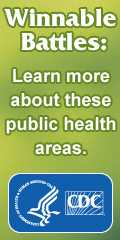April 2015
Did You Know? is a weekly feature from the Office for State, Tribal, Local and Territorial Support to inform your prevention activities. We invite you to read, share, and take action!
View the Current Did You Know?
April 24, 2015
- One of every 5,000 baby boys is born with hemophilia, and about 20,000 males in the US currently live with the bleeding disorder.
- Hemophilia can lead to joint disease, pain, and death if the bleeding can’t be stopped or if it occurs in the brain or other vital organ.
- Healthcare professionals can earn continuing education credits by completing CDC’s online course, Introduction to Hemophilia Care.
April 17, 2015
- Rates of teen births [PDF-387KB] and motor vehicle crash deaths [PDF-238KB] continue to fall, according to a new CDC Winnable Battles progress report.
- Use of innovative tools such as the Motor Vehicle Prioritizing Interventions and Cost Calculator for States is boosting progress, but one-third of the Winnable Battles targets are trending in the wrong direction.
- Public health practitioners can help make our nation healthier by using the evidence-based strategies and programs highlighted in the CDC Winnable Battles Progress Report 2014 [PDF-1.4MB].
April 10, 2015
- More than 273,000 infants, or 750 babies per day, were born to teens aged 15 to 19 [PDF–1.8MB] in 2013, according to the latest CDC Vital Signs.
- Teen childbearing carries high health, social, and economic costs for everyone—learn how your state ranks in rates of teen birth and pregnancy.
- Doctors can help prevent teen pregnancy by using CDC’s contraceptive guidance and discussing long-acting reversible contraceptives—such as IUDs and implants—as an option for teens.
April 3, 2015
- Whooping cough, or pertussis, is a very contagious disease that can cause babies to stop breathing—here’s what you need to know about preventing it.
- Infants are at greatest risk for getting whooping cough, so pregnant women should get vaccinated in the third trimester of each pregnancy.
- Doctors, nurses, and other healthcare professionals can use CDC’s many educational resources to teach parents about vaccines for whooping cough and other childhood diseases.
Did You Know? information and web links are current as of their publication date. They may become outdated over time.
- Page last reviewed: November 9, 2015
- Page last updated: October 13, 2016
- Content source:



 ShareCompartir
ShareCompartir



